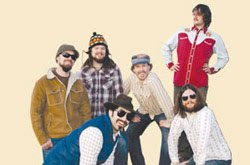 Everyone agrees these days; the music industry is changing. But San Francisco based band Ten Mile Tide saw the writing on the wall years ago. "We've been positioning ourselves for this change for years," says lead guitarist Jason Munning. In 2003 Ten Mile Tide rode the file-sharing wave by becoming one of the first bands to encourage music fans to download their music for free. While bands like Metallica and Britney Spears were suing their fans for illegally sharing their music, TMT went from a part-time local band to a full-time touring national act, fueled by the support of Kazaa fans who downloaded over 10 million TMT songs worldwide. Meet the new music industry, as independent band Ten Mile Tide releases it's newest album, "Riverstone", with a series of grass roots promotion strategies.
Everyone agrees these days; the music industry is changing. But San Francisco based band Ten Mile Tide saw the writing on the wall years ago. "We've been positioning ourselves for this change for years," says lead guitarist Jason Munning. In 2003 Ten Mile Tide rode the file-sharing wave by becoming one of the first bands to encourage music fans to download their music for free. While bands like Metallica and Britney Spears were suing their fans for illegally sharing their music, TMT went from a part-time local band to a full-time touring national act, fueled by the support of Kazaa fans who downloaded over 10 million TMT songs worldwide. Meet the new music industry, as independent band Ten Mile Tide releases it's newest album, "Riverstone", with a series of grass roots promotion strategies.Filesharing scared the industry though and the RIAA began suing individual music fans, a campaign which resulted in both the decline of filesharing and plummeting record sales nationwide. Then came iTunes, and now Pandora and Imeem and dozens of other startups looking to retool the digital music landscape. "The digital age is changing the music industry. It's been coming for years. Finally instead of fighting it, innovative industry leaders are learning to work with it," Munning says.
Ten Mile Tide will release their fourth album, "Riverstone" on Oct. 3rd, 2008. The band paid for the recording themselves, teaming up with their trusted, grammy-nominated producer Jack Gauthier of Dispatch fame (independent band turned big by giving their music away for free on Napster). TMT will use a host of grass roots marketing schemes to promote "Riverstone". Here are a few:
1. Video: TMT produced their own music video for the first single from the album -- "Heartbeat of San Francisco" -- by taping a digital camera to the dash of their van and taking snapshots every minute of their drive from the East coast home to San Francisco. The video will debut on YouTube.
2. Digital Distribution: CD Baby will take care of digital distribution including internet music stores like iTunes, Rhaposody, and more. TMT is also looking to partner with the innovative new startups who are pioneering the new music industry landscape such as Pandora, Imeem, and eMusic. After the initial CD release, TMT will offer digital downloads of their albums on the "pay-what-you-can" model popularized by Radiohead. "First and foremost we want people to enjoy our music," says Munning, " That's the reason we made it. Secondly, we need to figure out how to make enough money to keep being able to make our music. That is the challenge that everyone in the music industry today is facing."
3. Social Networking sites: Facebook and MySpace have become strong promotional tools for independent bands and TMT will use their network of friends on both to promote the release of Riverstone. But that's not all. For every major social networking or independent music website you've heard of, there are hundreds of startups in varying stages of development and launch. "We are going to post our music on all of the music and social networking sites we can find. You never know which one is going to be the next big thing and we're going to be sure to get in on the ground floor."
4. Radio: The band will send Riverstone to over 1,000 commercial, college, independent, and yes, internet radio stations and do their own follow up to see if the new album can show up on the charts. Their last album (self-titled) saw some songs in the top 50 on the Americana charts and TMT is confident they can do it again. "This album has some real hits on it," Munning grins, "We didn't plan on it, we just wrote the songs but everyone who hears them thinks they are hits". Three potential hits are "Heartbeat of San Francisco", "You and Me Gonna Get Drunk Tonight", and the title track, "Riverstone" which the band describes as rock, country, and Americana, respectively. "Our music is a blend of folk-rock, old-school country, and Americana. There is really something for everyone on this new album."
5. Reviews: TMT will be submitting the album for reviews to hundreds of publications from newspapers to magazines to webzines including college, independent, and mainstream media.
6. Publishing: TMT's past albums have found song placement in several inpendent movies. Publishing in indy movies and TV shows will be a strategy TMT pursues heavily with Riverstone. One site TMT is on is Beatpick.com, an Italy-based Internet site which helps pair indy musicians with indy filmakers.
7. Activism: The band is also aligning themselves with other grass roots causes, using their music to support the values they believe in. On their October CD release tour, TMT has arranged to play daytime Obama support rallies before their evening shows in college towns throughout Oregon, Washington, and Idaho. On the green side of things, "Riverstone" will be printed in a new packaging style called "eco-wallets", 4-panel cardboard sleeves which eliminate all plastic from the packaging.
Despite, or rather because of, their successes as an independent band, TMT is actively looking for a label and management. "The music industry is still changing and we are looking for pioneers in the music industry that believe in what we are doing and are interested in pursuing innovative and creative approaches to marketing and promotion." Importantly, Ten Mile Tide believes the industry is changing in a positive way. "More people than ever are excited about music these days. We see it in attendance at our shows, forums and blog posts, digital downloads, street team participation, and even CD sales."
More than anything, Ten Mile Tide is looking forward to the release. "This is a really exciting time," says Munning. "There's a whole generation of music fans looking for something new and different and now there are so many tools out there for independent musicians. We've got a new album, we've got a buzz, and after 4 years on the road we still all love each other. I'd say we're in pretty good shape."
Ten Mile Tide CD Release Party
Tuesday, October 3rd & Wednesday October 4th
The Connecticut Yankee
10pm - 2am
21+
